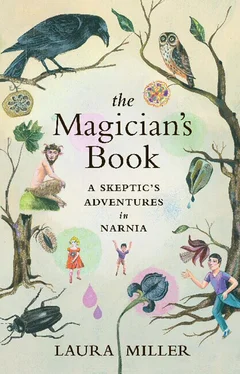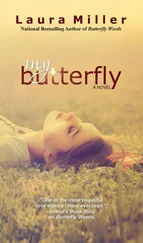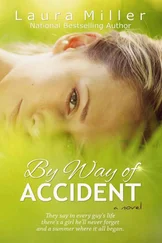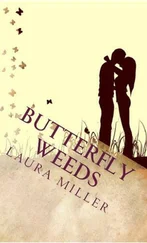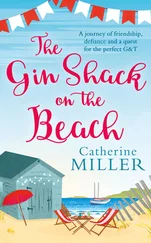Like the Green Lady’s underground kingdom, the medieval universe had its ceiling, its (false) limits. Did Lewis ever feel that he was running around in circles? He shared my attraction to “twilight” and “undiscovered byways,” wayward forces that eluded the moral polarities of the great monotheistic religions born in the Middle East. But to admit such things into his picture of the world would undermine the very quality that made that picture so comforting: its comprehensive, celestial harmony. Fairies, neither angels nor men, neither good nor evil, have no place in God’s plan. That is the real source of their appeal and their threat, and the reason why fundamentalists object to witches, wizards, and other occult elements in children’s books. It’s not that these figures lure readers to Satanism, but that they introduce the possibility that God and Satan are not your only options. Whether or not you believe in fairies, they stand for that choice, for the third road.
Lewis certainly felt the appeal of such figures, the imaginary companions of his boyhood’s secret life and the native spirits of his homeland, so much more captivating than men in sandals and robes. Perhaps he felt sometimes that his own trumpeted faith was a bit claustrophobic. Otherwise, why include a whole chapter on the Longaevi in The Discarded Image, and why characterize them as a source of relief? Lewis’s delight in the subject is evident in the reading of that chapter, but his own enthusiasm may also have troubled him a little. When he wrote a fairy into the Chronicles, she had to be made to embody all the most perilous spiritual traps — sensuality, the dominance of the female, materialism, pride.
But even the Green Witch’s subterranean kingdom has its own otherworld, an alternate reality, a third road. It is the “Really Deep Land,” known to the gnomes as Bism. When Rilian kills the witch, the floor of her kingdom cracks open, and the way to Bism is revealed. This, as the gnome Golg explains, is the true homeland of the Green Witch’s former slaves, and our heroes snatch a glimpse from the brink of the chasm:
They could make out a river of fire, and, on the banks of that river, what seemed to be fields and groves of an unbearable, hot brilliance — though they were dim compared to the river. There were blues, reds, greens and whites all jumbled together: a very good stained-glass window with the tropical sun staring straight through it at midday might have something of the same effect…. “Yes,” said Golg, “I have heard of those little scratches in the crust that you Topdwellers call mines. But that’s where you get dead gold, dead silver, dead gems. Down in Bism we have them alive and growing. There I’ll pick you bunches of rubies that you can eat and squeeze you a cupful of diamond juice.”
In Bism, salamanders, “too white-hot to look at,” swim in the fire river and talk to the gnomes. They are “wonderfully clever with their tongues: very witty and eloquent.” The prince and Eustace can barely restrain themselves from accepting the gnome’s invitation to adventure there (at this moment, Eustace recalls the example of Reepicheep), but duty to Narnia restrains them, as it does Caspian at the end of The Voyage of the Dawn Treader. “I fear it must be so,” says Rilian, when he agrees to return to the overworld. “But I have left half my heart in the land of Bism.”
So did I, and so, I believe, did Lewis. Bism remains one of Narnia’s tantalizing loose threads, the dozen or so untold stories that he alludes to from time to time. How did Doctor Cornelius obtain Queen Susan’s horn? How did the Lone Islands become a Narnian protectorate? Why was the star Coriakin demoted to mere magician status and why does he hang, in his hallway, a little mirror with hair on the top and a beard on the bottom? How did Fair Olvin turn the giant Pire to stone? And so on. These hints are part of what creates the impression that Narnia, as Neil Gaiman puts it, is “an infinite number of stories waiting to happen.” It is permeable and fluid, a realm where anything might occur.
Narnia is itself, of course, a vision of Faerie, as evidenced in the way Narnian time passes differently from the time of our world. Like Faerie, it mostly consists of a great forest. Where the imagery of the Bible is Mediterranean — vineyards, roads, and villages — the landscape of Narnia is northern, thick with trees. The wilderness of the Middle East is the desert, an empty, harsh, barren place; trees there are few and carefully nurtured, the obedient bearers of figs and olives. In northern Europe the wild is woods; the very world itself, according to Norse mythology, is a tree: Yggdrasil, the World Ash. There, the uncivilized world is not empty but full, populated by any number of strange creatures and people going about their unfathomable, ancient business. The biblical wilderness offers little more than death and deprivation; the tribes of Israel wandered there, their lives and history in suspension. But the British wilderness is where stories begin, where the old gods live, where young men go to seek their fortunes, where nature and humanity resume a long and exciting conversation.
“Wildness” is what Lewis names the welcome note that fairies introduce to the medieval universe, and “wild” is a word to conjure with in Narnia. Aslan, we’re repeatedly told, is “not a tame lion,” the music the fauns play is wild, and so are the red dwarves and everything else Narnian that the Telmarines are at war with at the beginning of Prince Caspian. Wildness is Bacchus and his rampaging girl followers, so joyful, so untrammeled, and ultimately so enticing that Lewis knew he’d gotten carried away and felt obliged to have Susan nervously remind his readers (and possibly himself) that they aren’t very safe.
This is not the real wildness of, say, the backcountry of California’s Sierra Nevada, the woods of my own girlhood, beautiful but vast, harsh, and inhospitable; that is not wildness but wilderness. Lewis never set foot in such a place. Narnia’s wildness is the wildness of Rostrevor Forest, where I got lost in the fog on one miserable and eventually rainy afternoon. I tramped around in soggy circles before I finally found my way out, but at no point was I as truly frightened as I would have been if I were in Yosemite. I knew that the woods were so small that if I walked long enough I’d come to the edge. I would meet neither bears nor mountain lions; large predators vanished along with all the substantial forests in England many centuries ago. You can die in the wilderness where I come from; hikers do all the time. In Britain, you might catch a bad cold.
But the wildness of Lewis’s Britain is no less vivid for being notional and poetic. It is an idea about the natural world, not nature itself, the product of the Britons’ long, interpenetrating relationship with their environment. The people got into the land — draining it, plowing it, shaping it, tending the woods almost as diligently as they tended the fields — and the land got into the people. The memory of the lost forest is all the more potent because it is a memory and has graduated into the realm of myth. It has become the emblem of the oldest of the old religions, which, as every Briton knows, worshipped the trees. So, in Puck of Pook’s Hill, a book in which the eponymous fairy acquaints two children with England’s historical roots, Rudyard Kipling includes a song:
Oh, do not tell the Priest our plight,
Or he would call it a sin;
But — we have been out in the woods all night,
A-conjuring Summer in!
And we bring you news by word of mouth —
Good news for cattle and corn —
Now is the Sun come up from the South,
With Oak and Ash and Thorn!
Читать дальше
